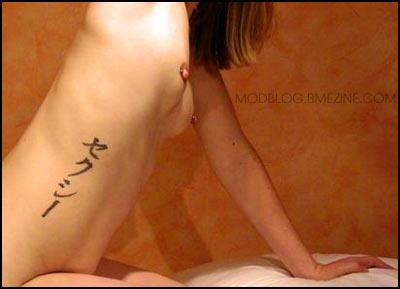I suspect most of all because I put a major typo in the caption, writing “Canonese” instead of “Cantonese”, a lot of people have been writing in corrections on a Kanji piece currently in the BME galleries. Anyway, the wearer told me that it said “sexy in Cantonese”.

This isn’t some kanji tattoo horror story, but at the same time, the caption isn’t quite correct. What it actually says is “se-ku-shi” in Japanese Katakana, which would be the closest phonetic translation of “sexy” (so in a way, it’s sort of like speaking English with a really thick Japanese accent and pretending that you’re speaking Chinese). It pretty much does say “sexy”, just not quite in the way they thought.
Anyway, thanks to everyone who wrote in about it.
 BME/News and Modblog highlight only a small fraction of what
BME/News and Modblog highlight only a small fraction of what
The following comments were imported from our old comment system:
Posted on 11-03-2005 01:06:01 by Jedi Kim
This reminds me of a time I had to help a client spell her daughters name phonetically in Katakana. I gave her a disclaimer that I do not speak the language and this isn’t really how you spell ones name in Japanese. She was okay with it, or more like ecstatic, but I found it really weird.
Posted on 11-06-2005 16:46:42 by Elaine
“iroke” is the traditional Japanese word for “sexiness,” but “sekushii” has been adopted into the language. Like how Americans borrowed the word “chic.” Everybody understands it, and I’m betting its use is particularly popular among the younger crowd. Part of its allure is how exotically foreign it sounds. All words borrowed by the Japanese from other languages are written in katakana — for example, “arubaito” is the Japanese word borrowed from German for “part-time job,” and it’s also written in katakana.
Generally I think getting katakana tattooed on yourself is particularly cheesy, but in this case… it’s kind of ironically cute.
Worst katakana tattoo I ever saw was some white dude’s name: Ken. Uuuggghh. Might as well have gotten it tattooed on him in English, like those name tags: “Hi, My Name Is: Ken.”
Posted on 11-27-2005 05:15:14 by h.
XDDDDDD “Ken”.
It is also unfortunate that the guy had to get such a name tattooed in the exact language where it means “dog”.
Posted on 12-14-2005 06:19:27 by Seijaku
“Ken” means Sword in Japanese.
“Inu” means dog.
Posted on 05-03-2006 11:38:58 by nichol
“Ken” means Sword in Japanese.
“Inu” means dog.
HOLY SHIT YOU’RE RIGHT! ¢(inu) does mean dog! It can also be read as ken, however… you pickle.
The following comments were imported from our old comment system:
Posted on 11-03-2005 01:06:01 by Jedi Kim
This reminds me of a time I had to help a client spell her daughters name phonetically in Katakana. I gave her a disclaimer that I do not speak the language and this isn’t really how you spell ones name in Japanese. She was okay with it, or more like ecstatic, but I found it really weird.
Posted on 11-06-2005 16:46:42 by Elaine
“iroke” is the traditional Japanese word for “sexiness,” but “sekushii” has been adopted into the language. Like how Americans borrowed the word “chic.” Everybody understands it, and I’m betting its use is particularly popular among the younger crowd. Part of its allure is how exotically foreign it sounds. All words borrowed by the Japanese from other languages are written in katakana — for example, “arubaito” is the Japanese word borrowed from German for “part-time job,” and it’s also written in katakana.
Generally I think getting katakana tattooed on yourself is particularly cheesy, but in this case… it’s kind of ironically cute.
Worst katakana tattoo I ever saw was some white dude’s name: Ken. Uuuggghh. Might as well have gotten it tattooed on him in English, like those name tags: “Hi, My Name Is: Ken.”
Posted on 11-27-2005 05:15:14 by h.
XDDDDDD “Ken”.
It is also unfortunate that the guy had to get such a name tattooed in the exact language where it means “dog”.
Posted on 12-14-2005 06:19:27 by Seijaku
“Ken” means Sword in Japanese.
“Inu” means dog.
Posted on 05-03-2006 11:38:58 by nichol
“Ken” means Sword in Japanese.
“Inu” means dog.
HOLY SHIT YOU’RE RIGHT! ¢(inu) does mean dog! It can also be read as ken, however… you pickle.